|
|
|
Sort Order |
|
|
|
Items / Page
|
|
|
|
|
|
|
| Srl | Item |
| 1 |
ID:
162424
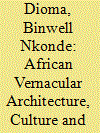

|
|
|
|
|
| Summary/Abstract |
The influence of imported material, technology and methods has put pressure on most traditional architectural systems to modernize. This influence to modernize is transmitted through various mechanisms. This paper argues that there are a number of aspects to vernacular architecture that would be lost through this conversion process to modern materials, technology and methods. Through the examination of vernacular architecture among the Lamba people of Senior Chief Mushili’s chiefdom, the study found that there are cultural, environmental and aesthetical aspects in vernacular architecture that are poorly understood in the process of modernization. Data for this research were collected through an ethnographical approach with occasional in-depth interviews with senior members of the Royal establishment and the community. Thus, the data were mainly qualitative.
|
|
|
|
|
|
|
|
|
|
|
|
|
|
|
|
| 2 |
ID:
092682
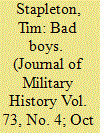

|
|
|
| 3 |
ID:
116434
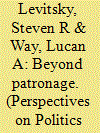

|
|
|
|
|
| Publication |
2012.
|
| Summary/Abstract |
We explore the sources of durability of party-based authoritarian regimes in the face of crisis. Recent scholarship on authoritarianism suggests that ruling parties enhance elite cohesion-and consequently, regime durability-by providing institutionalized access the spoils of power. We argue, by contrast, that while elite access to power and spoils may ensure elite cooperation during normal times, it often fails to do so during crises. Instead, the identities, norms, and organizational structures forged during periods of sustained, violent, and ideologically-driven conflict are a critical source of cohesion-and durability-in party-based authoritarian regimes. Origins in violent conflict raise the cost of defection and provide leaders with additional (non-material) resources that can be critical to maintaining unity and discipline, even when a crisis threatens the party's hold on power. Hence, where ruling parties combine mechanisms of patronage distribution with the strong identities, solidarity ties, and discipline generated by violent origins, regimes should be most durable.
We apply this argument to four party-based competitive authoritarian regimes in post-Cold War Africa: Kenya, Mozambique, Zambia, and Zimbabwe. In each of these cases, an established single- or dominant-party regime faced heightened international pressure, economic crisis, and a strong opposition challenge after 1990. Yet whereas ruling parties in Kenya and Zambia were organized almost exclusively around patronage, those in Mozambique and Zimbabwe were liberation parties that came to power via violent struggle. This difference is critical to explaining diverging post-Cold War regime outcomes: whereas ruling parties in Zambia and Kenya imploded and eventually lost power in these face of crises, those in Mozambique and Zimbabwe remained intact and regimes survived.
|
|
|
|
|
|
|
|
|
|
|
|
|
|
|
|
| 4 |
ID:
094680
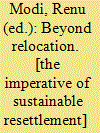

|
|
|
|
|
| Publication |
New Delhi, Sage Publications, 2009.
|
| Description |
xxx, 432p.
|
| Standard Number |
9788132100874
|
|
|
|
|
|
|
|
|
|
|
|
Copies: C:1/I:0,R:0,Q:0
Circulation
| Accession# | Call# | Current Location | Status | Policy | Location |
| 054856 | 333.3154/MOD 054856 | Main | On Shelf | General | |
|
|
|
|
| 5 |
ID:
145993
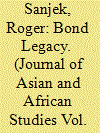

|
|
|
|
|
| Summary/Abstract |
This article surveys the intellectual, fieldwork, and professional career of the anthropologist George Clement Bond. Beginning in 1963, he conducted fieldwork in Zambia over four decades and produced a substantial body of writings on history, ritual, colonialism, and contemporary rural life. He also worked in Uganda in the 1980s on the HIV/AIDS crisis. From 1968, he taught at Columbia University, where he was Director of the Institute of African Studies. Bond’s measured outlook on the interrelated conceptual orientations and practical realities that confront the people anthropologists work among and learn from, and also shape their own circumstances, gave meaning and purpose to his work, which was recognized in honors and awards, speaking invitations, fellowships, and elected professional offices.
|
|
|
|
|
|
|
|
|
|
|
|
|
|
|
|
| 6 |
ID:
114932
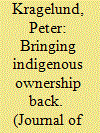

|
|
|
|
|
| Publication |
2012.
|
| Summary/Abstract |
African economies are currently experiencing an upsurge in foreign ownership of key parts of their economies. This, however, is not new, and in the wake of independence several African countries pursued indigenisation policies to bring ownership back to their own citizens. Now indigenisation policies thrive again, this time disguised in terms such as 'empowerment', but just as politicised as in the 1970s. Zambia is at the heart of this development. In the light of liberalisation, booming commodity prices and the increasing importance of Chinese investors, this article seeks to further our understanding of how processes of exclusion interact with domestic politics in Zambia. It argues that the Citizens Economic Empowerment Commission, a new institution to bring ownership back to Zambians, builds on a long tradition of nationalist policies in Zambia, while its actual work is strictly related to the critique of the growing foreign dominance over the economy, and in particular of the upsurge in Chinese investments.
|
|
|
|
|
|
|
|
|
|
|
|
|
|
|
|
| 7 |
ID:
131242
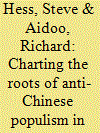

|
|
|
|
|
| Publication |
2014.
|
| Summary/Abstract |
In this article the authors conduct focused case studies on Zambia and Ghana to investigate the increasingly diverse popular reactions to Chinese engagement throughout the region of sub-Saharan Africa. In this effort they challenge the existing binary exploitation/opportunity paradigm through which growing Chinese engagement in sub-Saharan Africa is often analyzed. Instead, they propose an alternative framework, which centers less on the positive or nefarious nature of Chinese involvement and more on the institutional structures of African regimes. As opposed to closed autocracies and consolidated multiparty democracies, fluid transitional states create opportunities for the appearance of anti-Chinese populist movements akin to Michael Sata and the Patriotic Front in Zambia.
|
|
|
|
|
|
|
|
|
|
|
|
|
|
|
|
| 8 |
ID:
104729
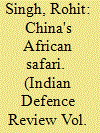

|
|
|
| 9 |
ID:
079537
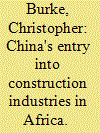

|
|
|
|
|
| Publication |
2007.
|
| Summary/Abstract |
Construction companies have played a key role as vanguards of China's engagement with Africa. China has a long history of relations with both Tanzania and Zambia, and the privatisation and deregulation of China's construction industry has been accompanied by a steady increase in the number of Chinese companies entering these two African countries. Differences in the construction industries of Tanzania and Zambia reveal interesting patterns in the participation of Chinese firms in these countries' economies. In Tanzania, the Chinese are not yet in competition with indigenous companies which lack capacity for large-scale projects. The standards of work completed by Chinese companies are considerably higher in Zambia where regulations and building codes are more strictly enforced. The Chinese have little interest in joint ventures, although they regularly subcontract local companies and procure considerable quantities of local materials and labour. Western companies maintain a decreasing advantage in specialised or technical areas of construction; however, the Chinese adapt more readily to the African environment and quickly find their feet. Once established, the only serious competition Chinese companies appear to face is from one another
|
|
|
|
|
|
|
|
|
|
|
|
|
|
|
|
| 10 |
ID:
176384
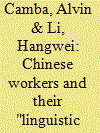

|
|
|
| 11 |
ID:
185142
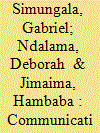

|
|
|
|
|
| Summary/Abstract |
We draw from the meaning-making practices on the margins, the communicative repertoires of the multilingual and multicultural students at two Southern African universities: the University of Zambia in Lusaka, Zambia; and the University of Malawi in Zomba, Malawi. As our locus, we are interested in the unique linguistic/semiotic coinages which constitute the students’ linguistic repertoires as multilingual innovations amenable to placemaking. In an attempt to do this, we purposefully unearth lexical innovations which we analyse within the broader framework of translanguaging. Thus, we show the emergence of (new) lexical items through the (re-)invention and disinvention of communicative resources, and the deployment of material artefacts of place as a basis for the creativity and innovation through repurposing of lexical items for new uses. Thus, we privilege students as active manipulators of their communicative practices by showing the semiotic/linguistic creativity and innovation inherent in their repertoires.
|
|
|
|
|
|
|
|
|
|
|
|
|
|
|
|
| 12 |
ID:
069172
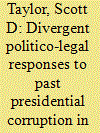

|
|
|
| 13 |
ID:
128467
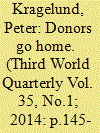

|
|
|
|
|
| Publication |
2014.
|
| Summary/Abstract |
The international development arena is currently subject to major changes in the geographies of power. In this article I analyse how and to what extent the (re)entry on the development scene of China, India and Brazil, together with increasing prices for primary commodities and improved access to international finance, has affected Zambia's political leverage to set, implement and fund its own developmental policies. I argue that, while real changes in external financial flows comparable to aid from these non-traditional state actors are still small, these actors' experience is providing Zambia with an alternative development model that combines purposive state intervention with market-based economic growth and integration into world markets. While Zambia may be taking the first steps in strengthening its 'sovereign frontier', the extent of this movement is still small and its development outcomes are far from assured.
|
|
|
|
|
|
|
|
|
|
|
|
|
|
|
|
| 14 |
ID:
170808
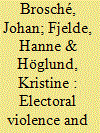

|
|
|
|
|
| Summary/Abstract |
Why do the first multiparty elections after authoritarian rule turn violent in some countries but not in others? This article places legacies from the authoritarian past at the core of an explanation of when democratic openings become associated with electoral violence in multi-ethnic states, and complement existing research focused on the immediate conditions surrounding the elections. We argue that authoritarian rule characterized by more exclusionary multi-ethnic coalitions creates legacies that amplify the risk of violent elections during the shift to multiparty politics. Through competitive and fragmented interethnic relations, exclusionary systems foreclose the forging of cross-ethnic elite coalitions and make hostile narratives a powerful tool for political mobilization. By contrast, regimes with a broad-based ethnic support base cultivate inclusive inter-elite bargaining, enable cross-ethnic coalitions, and reduce incentives for hostile ethnic mobilization, which lower the risk of violent elections. We explore this argument by comparing founding elections in Zambia (1991), which were largely peaceful, and Kenya (1992), with large-scale state-instigated electoral violence along ethnic lines. The analysis suggests that the type of authoritarian rule created political legacies that underpinned political competition and mobilization during the first multiparty elections, and made violence a more viable electoral strategy in Kenya than in Zambia.
|
|
|
|
|
|
|
|
|
|
|
|
|
|
|
|
| 15 |
ID:
089760
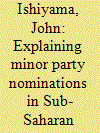

|
|
|
|
|
| Publication |
2009.
|
| Summary/Abstract |
To what extent do parties in Africa behave in ways similar to parties in new democracies elsewhere in the world? I examine nominations by the `minor' opposition parties to the single member districts for the legislative elections in Ethiopia, Malawi and Zambia. Using binary logit analysis, I found that generally the number of candidates running in a contest and the use of an `electoral arithmetic' by the parties explains whether they chose to nominate a candidate in a particular electoral district. However, the social demographic characteristics of districts appear to have little impact on whether or not a party nominates a candidate.
|
|
|
|
|
|
|
|
|
|
|
|
|
|
|
|
| 16 |
ID:
159402
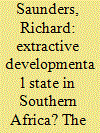

|
|
|
|
|
| Summary/Abstract |
In recent years, an upturn in international commodity markets and the poor development performance of mineral rich African countries have catalysed the resurgence of debate and policy initiatives focused on extractivist models of growth in southern Africa. Beginning with debates on the ‘resource curse’, the East Asian developmental state and ‘developmental patrimonialism’, we extend the discussion to consider key unique challenges in contemporary African states: questions of finance and debt leverage, foreign capital domination and the problematic legacy of neoliberal structural adjustment. We consider the cases of Zambia and Zimbabwe, two countries heavily reliant on mining, in which current policy interventions have sought to anchor developmental state ambitions in the restructuring of the minerals sector. These cases illuminate the significance of current developmentalist politics in southern Africa, and underscore their specificity and constraints. Developmentalist projects are unlikely to succeed in the short term, but retain importance as emerging points of critique of neoliberal states in transition.
|
|
|
|
|
|
|
|
|
|
|
|
|
|
|
|
| 17 |
ID:
099050
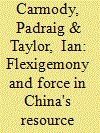

|
|
|
|
|
| Publication |
2010, 2010.
|
| Summary/Abstract |
The Chinese government and its companies have dramatically increased their presence in Africa in the last decade. There has been much media interest and commentary on the impacts of this engagement on governance in Africa, as it is often seen to be strengthening authoritarian states, such Sudan and Zimbabwe.1 However, Chinese actors are also engaging with more democratic states and spaces, such as Zambia. This article seeks to explore the impacts of increased Chinese engagement with Africa on governance through a comparative case study of two contrasting cases: Sudan and Zambia, using the concept of flexigemony. Contrary to popular perception, behaviour by Chinese actors has sometimes been a moderating force in Sudan, while provoking violence in Zambia.
|
|
|
|
|
|
|
|
|
|
|
|
|
|
|
|
| 18 |
ID:
109517


|
|
|
| 19 |
ID:
119286


|
|
|
|
|
| Publication |
2013.
|
| Summary/Abstract |
Dag Hammarskjöld died in a plane crash on 17 September 1961 on route to Ndola, Zambia, to negotiate an end to fighting between UN troops and the break-away Katanga army. The Rhodesian-led inquiry commission in 1961-62 concluded that a pilot error caused the crash while the UN commission in 1962 was inconclusive. These commissions neglected to actively search for Zambian witnesses of black African origin and neglected the testimonies from those that were heard. A systematic search during 2007-12 identified ten previously unknown Zambian eye witnesses whose testimonies provide sufficient new information to justify a new UN inquiry into the cause of the crash.
|
|
|
|
|
|
|
|
|
|
|
|
|
|
|
|
| 20 |
ID:
102402
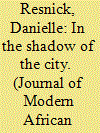

|
|
|
|
|
| Publication |
2011.
|
| Summary/Abstract |
Sub-Saharan Africa is the fastest urbanising region of the world. This demographic transformation has occurred in concert with two other trends in the region, nascent democratisation and stalled decentralisation. Using the case of Lusaka, Zambia, this study argues that in the context of multi-party competition and limited fiscal decentralisation, the challenges posed by rapid urbanisation are exacerbated for the urban poor living in cities controlled by opposition parties. Semi-structured interviews conducted with local political actors are combined with a survey of 200 informal sector workers in Lusaka. This data reveals the tactics employed by the central government to weaken the popularity of the opposition in Lusaka and shows that from the viewpoint of the urban poor, such tactics ultimately prove counterproductive. The presence of similar dynamics in other African cities has important implications for aid modalities, such as budget support, that are currently used by international donors to fund development projects, including those in the urban sector.
|
|
|
|
|
|
|
|
|
|
|
|
|
|
|
|
|
|
|
|
|